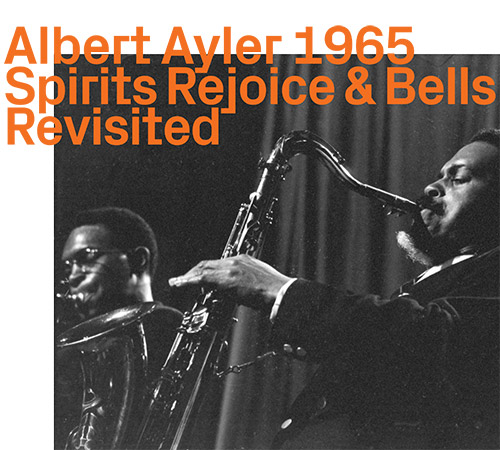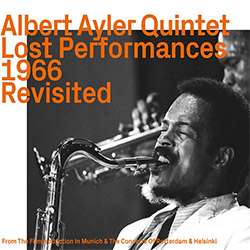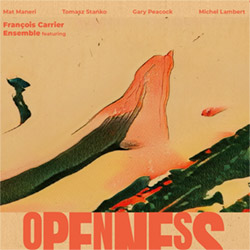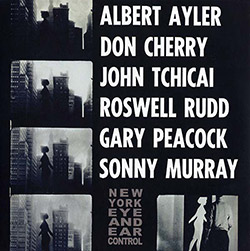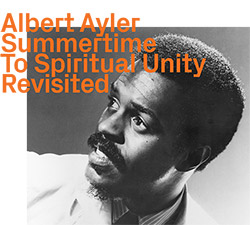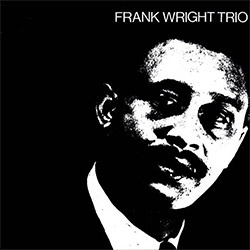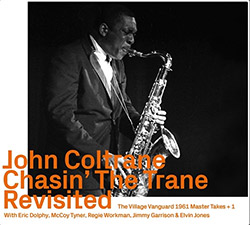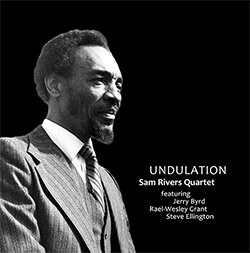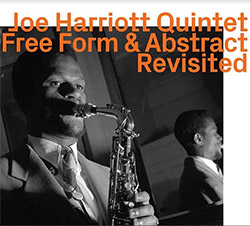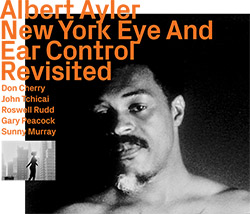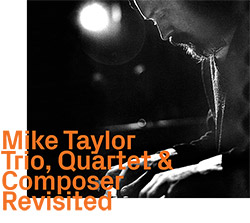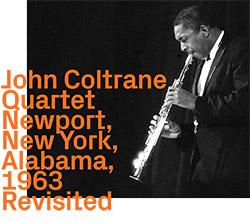
Revisiting two of the most essential and influential albums of saxophonist Albert Ayler's discography, both recorded in 1965 — Spirits Rejoice in a sextet and Bells in a quintet — both drawing from some of NY's finest players including Charles Tyler, Henry Grimes, Gary Peacock, Sunny Murray, Donald Ayler and Lewis Worrell, properly remastered to showcase Ayler's stunning conceptions in free jazz.
In Stock
Quantity in Basket: None
Log In to use our Wish List
Shipping Weight: 2.00 units
Sample The Album:
Albert Ayler-tenor saxophone
Donald Ayler-trumpet
Charles Tyler-alto saxophone
Call Cobbs-harpsichord
Henry Grimes-double bass
Gary Peacock-double bass
Sunny Murray-drums
Click an artist name above to see in-stock items for that artist.
UPC: 752156110927
Label: ezz-thetics by Hat Hut Records Ltd
Catalog ID: ezz-thetics 1109
Squidco Product Code: 29654
Format: CD
Condition: New
Released: 2020
Country: Switzerland
Packaging: Cardboard Gatefold
Tracks 1-5 recorded at Judson Hall, in New York, New York, in September, 1965.
.Track 6 recorded at Town Hall, on May 1st, 1965.
"Albert Ayler's recording career was a short one, spanning only the years 1962 - 1970, yet he went through several distinct phases and, of course, exerted a strong and still-lasting influence on subsequent music. In mid-1964, having sat in with Cecil Taylor and Ornette Coleman and having established a working trio with Gary Peacock and Sunny Murray, he reached an early creative peak when he melded his extreme, ecstatic and melody-drenched approach with some of the established luminaries of the avant-garde jazz scene in New York, including Don Cherry, Roswell Rudd and John Tchicai.
In early 1965, while retaining Murray, he formed a new ensemble made up of largely younger, less exposed musicians. His brother Donald (trumpet), alto saxophonist Charles Tyler and bassist Lewis Worrell complete the quintet heard on Bells, recorded live at Town Hall on May 1, 1965 (heard here at the conclusion of the disc). This was Tyler's first recorded performance and among the first by Donald Ayler and Worrell. The work is a kind of suite or, more accurately, a central thematic core bracketed by freer sections. At its onset, the collective improvisation bears a distinct resemblance to the opening sections heard on Ornette Coleman's double quartet session, Free Jazz, recorded several years earlier. A rapid and spattering trumpet solo from Donald Ayler is followed by an impressively forceful one from Tyler. Beneath this, one can hear a device that Albert Ayler would use frequently: having the bassist play arco in a manner that suggests a kind of drone, albeit a queasy, disorienting one, an idea possibly picked up from Coltrane who talked about doing so with reference to drones in Indian music (Ayler's intentions, clearly, would be more church-oriented). After a brief closing passage by the ensemble (which, again, sounds notably Coleman-esque), Ayler develops a very impassioned sequence, essentially solo, leading to the central thematic material of Bells. It's classic Ayler, incorporating his affinity for march-like passages but, to this listener, having to do more with an extended hymn approach, taking "simple" melodic forms, twisting and pushing them as far as he could, using the idea of speaking in tongues derived from the Pentecostal church but always having it embedded, somewhere, in song-form. The occasional counterpoint between Ayler's eruptions and the restatement of the melody by trumpet and alto is quite moving, as is the delicate intertwining head during the final two or three minutes, though the piece ends in the same conflagration with which it began, before a brief restatement of the theme.
By the fall of 1965, Ayler had assembled a sextet with two bassists, Gary Peacock and Henry Grimes replacing Worrell, possibly modeled on the similar usage by Coltrane. The Spirits Rejoice LP, originally issued by ESP, documents five pieces from a recording session (not a live concert) at Judson Hall in New York City. The title track is arguably Ayler in purest form, from the clarion, battle-charge evoking call of the horns to Ayler's throaty, ferocious tenor in fine fettle. The rest of the ensemble is also stellar, including brother Donald's blistering work and, as on Bells, one of the bassists (presumably Grimes) providing those haunting, eerie bowed lines, destabilizing the structure quite effectively. Not to mention Sunny Murray's resolute refusal to keep standard time, having long since devoted himself to an entirely coloristic approach, almost becoming another horn. 'Holy Family' is succinct and almost catchy while 'D.C.' is an exercise in fragmentation, jaggedly lurching back and forth between a minimal theme and solos, the musicians finding their way to a fascinating and intricate interplay between basses and drums. In some sense the wild card of the set, 'Angels' adds harpsichordist Call Cobbs into the mix. The nimble, inevitably Baroque lines sound somewhat out of place at first but are quickly subsumed beneath Ayler's enormous tone, especially heartfelt and poignant here, clearly presaging similar excursions into blues and gospel-drenched depths on the part of tenorists from Joe McPhee to David Murray and beyond. Everything leads up, however, to 'Prophet', Ayler's furthest leap into free playing yet. After a nominal "theme" that consists of high yelps from the band, it's all high-energy free playing, everything undergirded by Murray's unique and perversely propulsive drums. Another intense two-bass/drum feature leads to a re-emergence of those yipping cries and a final explosive cacophonic outcry.
Together, Spirits Rejoice and Bells encapsulate a four month period where long-gestating ideas of Ayler's were birthed, helping to usher in a conception of music unlike virtually anything else extant, paving the way for his own adventures of the next several years and, perhaps more importantly, providing an extremely fertile bed for a generation or two of musicians to come."-Brian Olewnick, February 24, 2020
Artist Biographies
• Show Bio for Albert Ayler "Albert Ayler (born July 13, 1936 - November 25, 1970) was an American avant-garde jazz saxophonist, singer and composer. After early experience playing R&B and bebop, Ayler began recording music during the free jazz era of the 1960s. However, some critics argue that while Ayler's style is undeniably original and unorthodox, it does not adhere to the generally accepted critical understanding of free jazz. In fact, Ayler's style is difficult to categorize in any way, and it evoked incredibly strong and disparate reactions from critics and fans alike. His innovations have inspired subsequent jazz musicians. His trio and quartet records of 1964, such as Spiritual Unity and The Hilversum Session, show him advancing the improvisational notions of John Coltrane and Ornette Coleman into abstract realms where whole timbre, and not just mainly harmony with melody, is the music's backbone. His ecstatic music of 1965 and 1966, such as "Spirits Rejoice" and "Truth Is Marching In", has been compared by critics to the sound of a brass band, and involved simple, march-like themes which alternated with wild group improvisations and were regarded as retrieving jazz's pre-Louis Armstrong roots. Early life and career Born in Cleveland, Ohio, Ayler was first taught alto saxophone by his father Edward, who was a semiprofessional saxophonist and violinist. Edward and Albert played alto saxophone duets in church and often listened to jazz records together, including swing era jazz and then-new bop albums. Ayler's upbringing in the church had a great impact on his life and music, and much of his music can be understood as an attempt to express his spirituality, including the aptly titled Spiritual Unity, and his album of spirituals, Goin' Home, which features "meandering" solos that are meant to be treated as meditations on sacred texts, and at some points as "speaking in tongues" with his saxophone. Ayler's experience in the church and exposure to swing jazz artists also impacted his sound: his wide vibrato was similar to that of gospel saxophonists, who sought a more vocal-like sound with their instruments, and to that of brass players in New Orleans swing bands. Ayler attended John Adams High School on Cleveland's East Side, and graduated in 1954 at the age of 18. He later studied at the Academy of Music in Cleveland with jazz saxophonist Benny Miller. Ayler also played the oboe in high school. As a teenager, Ayler's understanding of bebop style and mastery of standard repertoire earned him the nickname of "Little Bird", after Charlie "Bird" Parker, in the small Cleveland jazz scene. In 1952, at the age of 16, Ayler began playing bar-walking, honking, R&B-style tenor with blues singer and harmonica player Little Walter, spending two summer vacations with Walter's band. In 1958, after graduating from high school, Ayler joined the United States Army, where he switched from alto to tenor sax and jammed with other enlisted musicians, including tenor saxophonist Stanley Turrentine. Ayler also played in the regiment band, along with future composer Harold Budd. In 1959 he was stationed in France, where he was further exposed to the martial music that would be a core influence on his later work. After his discharge from the army, Ayler tried to find work in Los Angeles and Cleveland, but his increasingly iconoclastic playing, which had moved away from traditional harmony, was not welcomed by traditionalists. Ayler relocated to Sweden in 1962, where his recording career began, leading Swedish and Danish groups on radio sessions, and jamming as an unpaid member of Cecil Taylor's band in the winter of 1962-63. (Long-rumored tapes of Ayler performing with Taylor's group were released by Revenant Records in 2004, as part of a 10-CD set.) The album My Name Is Albert Ayler is a session of standards recorded for a Copenhagen radio station with local musicians including Niels-Henning Ørsted Pedersen and drummer Ronnie Gardiner, with Ayler playing tenor and soprano on tracks such as "Summertime".Early recording career In 1963, Ayler returned to the US and settled in New York City, where he continued to develop his personal style and occasionally played alongside free jazz pianist Cecil Taylor. 1964 was the most well-documented year of Ayler's career, during which he recorded many albums, the first of which was Witches and Devils in March of that year. Ayler also began his rich relationship with ESP-Disk Records in 1964, recording his breakthrough album (and ESP's very first jazz album) Spiritual Unity for the then-fledgling record label. ESP-Disk came to play an integral role in recording and disseminating free jazz. Spiritual Unity featured the trio that Ayler had just assembled that summer, including bassist Gary Peacock and drummer Sunny Murray. The liner notes of Spiritual Unity include a brief description of the musicians on that day, July 10, 1964, in the Variety Arts Recording Studio. Just before 1 PM, Sunny Murray arrived, a large, genial walrus....Gary Peacock was next, tall, thin, ascetic looking, and soft spoken....Albert Ayler was last, small, wary, and laconic. On July 17, 1964 the members of this trio, along with trumpet player Don Cherry, alto saxophonist John Tchicai, and trombonist Roswell Rudd, collaborated in recording New York Eye and Ear Control, a freely improvised soundtrack to Canadian artist and filmmaker Michael Snow's film of the same name. During this time, Ayler began to garner some attention from critics, although he was not able to foster much of a fan following. However, later in 1964, Ayler, Peacock, Murray, and Cherry were invited to travel to Europe for a brief Scandinavian tour, which too yielded some new recordings, including The Copenhagen Tapes, Vibrations, and The Hilversum Session. Ayler recorded Bells on May 1, 1965. It is a ferociously-paced 20-minute improvisation featuring his signature military-march influenced melodies. Spirits Rejoice was recorded on September 23, 1965 at Judson Hall in New York City, and features a much larger band than the sparse trio of his earlier album Spiritual Unity. The Encyclopedia of Popular Music describes Spirits Rejoice as a "riotous, hugely emotional and astonishingly creative celebration of the urge to make noise." Both albums feature Albert's brother, trumpet player Donald Ayler, who translated his brother's expansive approach to improvisation to the trumpet. Donald played with Albert until he experienced a debilitating nervous breakdown in 1967. In 1966 Ayler was signed to Impulse Records at the urging of Coltrane, the label's star attraction at that time. But even on Impulse, Ayler's radically different music never found a sizable audience. Ayler's first set for Impulse was recorded a few weeks before Christmas in 1966, entitled Albert Ayler in Greenwich Village. Ayler performed with his brother, Michel Samson, Beaver Harris, Henry Grimes, and Bill Folwell, and his Coltrane was in attendance. For a tune titled "For John Coltrane," Ayler returned to the alto saxophone for the first time in years. Ayler first sang on a recording in a version of "Ghosts" performed in Paris in 1966, in which his vocal style was similar that of his saxophone, with an eerie disregard for pitch. Ayler continued to experiment with vocals for the rest of his career. In 1967, John Coltrane died of liver cancer, and Ayler was asked to perform at his iconic funeral. It is said that during his performance, Ayler ripped his saxophone from his mouth at two points: once, to emit a cry of anguish, the other a cry of joy to symbolize his friend and mentor's ascension into heaven.Final years For the next two and half years Ayler began to move from a mostly improvisatory style to one that focused more closely on compositions. This was largely a result of pressures from Impulse who, unlike ESP-Disk, placed heavier emphasis on accessibility than artistic expression. In 1967 and 1968, Ayler recorded three LPs that featured the lyrics and vocals of his girlfriend Mary Maria Parks and introduced regular chord changes, funky beats, and electronic instruments. Ayler himself sang on his album New Grass, which hearkened back to his roots in R&B as a teenager. However, this album was remarkably unsuccessful, scorned by Ayler fans and critics alike. Ayler staunchly asserted that he wanted to move in this R&B and rock-and-roll direction, and that he was not simply succumbing to the pressures of Impulse and the popular music of that day, and it is true that Ayler heavily emphasizes the spirituality that seems to define the bulk of his work. New Grass begins with the track "Message from Albert," in which Ayler speaks directly to his listener, explaining that this album was nothing like his ones before it, that was of "a different dimension in [his] life." He claims that, "through meditation, dreams, and visions, [he has] been made a Universal Man, through the power of the Creator..." In 1968, Ayler submitted an impassioned, rambling open letter to Cricket magazine entitled "To Mr. Jones-I Had a Vision," in which he describes startling apocalyptic spiritual visions. He "saw in a vision the new Earth built by God coming out of Heaven," and implores the readers to share the message of Revelations, insisting that "This is very important. The time is now." His final album, Music Is the Healing Force of the Universe, featured rock musicians such as Henry Vestine of Canned Heat alongside jazz musicians like pianist Bobby Few. This was a return to his blues-roots with very heavy rock influences, but did feature more of Ayler's signature timbre variations and energetic solos than the unsuccessful New Grass. In July 1970 Ayler returned to the free jazz idiom for a group of shows in France (including at the Fondation Maeght), but the band he was able to assemble (Call Cobbs, bassist Steve Tintweiss and drummer Allen Blairman) was not regarded as being of the caliber of his earlier groups. Ayler disappeared on November 5, 1970, and he was found dead in New York City's East River on November 25, a presumed suicide. For some time afterwards, rumors circulated that Ayler had been murdered, with a long standing urban legend that the Mafia tied him to a jukebox. Later, however, Parks would say that Ayler had been depressed and feeling guilty, blaming himself for his brother's problems. She stated that, just before his death, he had several times threatened to kill himself, smashed one of his saxophones over their television set after she tried to dissuade him, then took the Statue of Liberty ferry and jumped off as it neared Liberty Island. He is buried in Highland Park Cemetery in Beachwood, Ohio." ^ Hide Bio for Albert Ayler • Show Bio for Donald Ayler "Donald Ayler (October 5, 1942 - October 21, 2007) was a jazz trumpeter and younger brother to saxophonist Albert Ayler. Born in Cleveland Heights, Ohio, he went on to work with his brother in the mid-1960s. In 1967 Donald had what he termed a "nervous breakdown", which affected his brother's life as well. In 1970 his brother's death affected him deeply. After that he did work with a septet in Florence, but remains best known for his connection to Albert. Donald appears in the documentary film My Name Is Albert Ayler where he talks about his and Albert's life, their music and their relationship. He is also featured in archival footage from concerts in Europe in 1966. The new sequences with him were filmed in Cleveland, Ohio in 2001 and 2002. Ayler suffered a sudden heart attack on Sunday October 21, 2007, and died at home in Northfield, Ohio." ^ Hide Bio for Donald Ayler • Show Bio for Charles Tyler "Charles Lacy Tyler (July 20, 1941 - June 27, 1992) was an American jazz baritone saxophonist. He also played alto saxophone and clarinet. Tyler was born in Cadiz, Kentucky, and spent his childhood years in Indianapolis. He played piano as a child and clarinet at 7, before switching to alto in his early teens, and finally baritone saxophone. During the summers, he visited Chicago, New York City and Cleveland, Ohio, where he met the young tenor saxophonist Albert Ayler at age 14. After sering in the army from 1957-1959, Tyler relocated to Cleveland in 1960 and began playing with Ayler, conmuting between New York and Cleveland. During that period played with Ornette Coleman and Sunny Murray. In 1965 Tyler recorded Bells and Spirits Rejoice with Alyer's group. He recorded his first album as leader the following year for ESP-Disk. He returned to Indianapolis to study with David Baker at Indiana University between 1967 and 1968, recording a second album for ESP, Eastern Man Alone. In 1968, he transferred to the University of California, Berkeley to study and teach. In Los Angeles, he worked with Arthur Blythe, Bobby Bradford, and David Murray. He moved back to New York in 1974, leading his own groups with Blythe, trumpeter Earl Cross, drummer Steve Reid and others, recording the album Voyage from Jericho on Tyler's own Akba label. In 1975, Tyler enrolled at Columbia University and made an extensive tour of Scandinavia, releasing his second Akba album Live in Europe. In 1976, he performed the piece "Saga of the Outlaws" at Sam Rivers's Studio Rivbea, released two years later on Nessa Records. During that period he played as a sideman or co-leader with Steve Reid, Cecil Taylor and Billy Bang. In 1982, during a European tour with Sun Ra's Orchestra, he relocated to Denmark, and in 1985 he moved to France, recording with other expatriates like Khan Jamal in Copenhagen and Steve Lacy in Paris. Tyler died in Toulon, France of heart failure in June 1992." ^ Hide Bio for Charles Tyler • Show Bio for Call Cobbs "Harvey Call Cobbs Jr. (January 30, 1911 - September 21, 1971), was an American jazz pianist, electric harpsichordist, and organist. He is remembered for his work with saxophonist Albert Ayler in the mid- and late-1960s. Cobbs was born in Urbana, Ohio, to Harvey Call Cobbs Sr. and Ethel Hill Cobbs. His father, known as Harry Cobbs, was a church janitor. In his youth, Cobbs served as companion and guide to the pianist Art Tatum and later accompanied Billie Holiday and replaced Hampton Hawes in the band of Wardell Gray. Cobbs worked and recorded with the alto saxophonist Johnny Hodges in 1954, when Hodges' band included John Coltrane. He studied the Schillinger System of musical composition. He is best remembered for his work with the free jazz saxophonist Albert Ayler from 1964 through 1970, playing piano, rocksichord, and electronic organ in live performances and recordings. He also acted as Ayler's copyist and musical director. When Ayler's body was found floating in the East River in New York City on November 25, 1970, Cobbs was called upon to identify the body. Cobbs was killed in a hit and run collision on September 21, 1971. He died at Jacobi Medical Center in The Bronx at the age of 60." ^ Hide Bio for Call Cobbs • Show Bio for Henry Grimes "As of the beginning of 2016, master jazz musician Henry Grimes (acoustic bass, violin, poetry, illustrations) had played more than 615 concerts in 31 countries (including many festivals) since 2003, when he made his astonishing return to the music world after 35 years away. He was born and raised in Philadelphia and attended the Mastbaum School (1949-52) and Juilliard (1952-54). As a youngster in the '50's and early '60's, he came up in the music playing and touring with Willis "Gator Tail" Jackson, Arnett Cobb, "Bullmoose" Jackson, "Little" Willie John, King Curtis, and a number of other great R&B / soul musicians; but drawn to jazz, he went on to play, tour, and record with many great jazz musicians of that era, including Albert Ayler, Don Cherry, Benny Goodman, Coleman Hawkins, Roy Haynes, Lee Konitz, Steve Lacy, Charles Mingus, Thelonious Monk, Gerry Mulligan, Sunny Murray, Sonny Rollins, Pharoah Sanders, Archie Shepp, Cecil Taylor, and McCoy Tyner. Sadly, a trip to the West Coast to work with Al Jarreau and Jon Hendricks went awry, leaving Henry in Los Angeles at the end of the '60's with a broken bass he couldn't pay to repair, so he sold it for a small sum and faded away from the music world. Many years passed with nothing heard from him, as he lived in his tiny rented room in an S.R.O. hotel in downtown Los Angeles, working as a manual laborer, custodian, and maintenance man, and writing many volumes of handwritten poetry. He was discovered there by a Georgia social worker in 2002 and was given a bass by William Parker, and after only a few weeks of ferocious woodshedding, Henry emerged from his room to begin playing concerts around Los Angeles and shortly afterwards made a triumphant return to New York City in May, 2003 to play in the Vision Festival. Since then, often working as a leader, he has played, toured, and / or recorded with many of this era's musical and literary heroes, such as Chris Abani, Rashied Ali, Geri Allen, Marshall Allen, Barry Altschul, Fred Anderson, Tatsu Aoki, Newman Taylor Baker, Billy Bang, Harrison Bankhead, Amiri Baraka, Joey Baron, Hamiet Bluiett, Dave Burrell, Roy Campbell Jr., Alex & Nels Cline, Cooper-Moore, Marilyn Crispell, Connie Crothers, Ted Curson, Andrew Cyrille, Thulani Davis, Toi Derricotte, Bill Dixon, Pierre Dorge, Hamid Drake, Paul Dunmall, Cornelius Eady, Kahil El'Zabar, Douglas Ewart, Bobby Few, Charles Gayle, Melvin Gibbs, Yoriyuki Harada, Craig Harris, Graham Haynes, Karma Mayet Johnson, Edward "Kidd" Jordan, Andrew Lamb, Nathaniel Mackey, Maria Mitchell, Nicole Mitchell, Roscoe Mitchell, Elaine Mitchener, Louis Moholo-Moholo, Meredith Monk [recording only], Jemeel Moondoc, Jason Moran, David Murray, Sunny Murray, Amina Claudine Myers, Zim Ngqawana, Kresten Osgood, William Parker, HPrizm (High Priest, Kyle Austin), Odean Pope, Avreeayl Ra, Tomeka Reid, Vernon Reid, Marc Ribot, Matana Roberts, Orphy Robinson, Brandon Ross, Lee Mixashawn Rozie, Mark Sanders, Rasul Siddik, Wadada Leo Smith, Warren Smith, Tyshawn Sorey, Sekou Sundiata, Tani Tabbal, Jamaaladeen Tacuma, Aldo Tambellini, Greg Tate, Cecil Taylor (reunion), Chad Taylor, John Tchicai, Pat Thomas, Henry Threadgill, Edwin Torres, Dwight Trible, Jeff "Tain" Watts, Ed Wilkerson Jr., James Zollar, John Zorn, and too many others to list here. In the past few years, Henry has also held a number of residencies and offered workshops and master classes on major campuses, including: Berklee College of Music (Boston); Buffalo Academy for Visual & Performing Arts (upstate New York); CalArts, hosted by Wadada Leo Smith (Valencia, California); the Carlucci School, with Andrew Lamb and Newman Taylor Baker (Portugal); Hamilton College of Performing Arts, with Rashied Ali (upstate New York); Humber College (Toronto); JazzInstitut Darmstadt (Germany); Mills College, hosted by Roscoe Mitchell (Oakland, California); New England Conservatory (Boston, Massachusetts); Scuole Bruscio and Scuole Poschiavo (Switzerland); the University of Gloucestershire at Cheltenham (U.K.); University of Illinois at Urbana-Champaign, Illinois; University of Michigan at Ann Arbor; and several more. Henry can be heard on about a dozen new recordings, made his professional debut on a second instrument (the violin) at the age of 70 alongside Cecil Taylor at Lincoln Center, has seen the publication of the first volume of his poetry, "Signs Along the Road," by a publisher in Cologne, and creates illustrations to accompany his new recordings and publications. He has received many honors in recent years, including four Meet the Composer grants. Mr. Grimes can be heard on 90+ recordings on various labels, including Atlantic, Ayler Records, Blue Note, Columbia, ESP-Disk, ILK Music, Impulse!, JazzNewYork Productions, Pi Recordings, Porter Records, Prestige, Riverside, and Verve. He is the subject of a new biography published in London, "Music to Silence to Music: A Biography of Henry Grimes" by Dr. Barbara Frenz, with a beautiful foreword by Sonny Rollins (http://tinyurl.com/h9f8mo4). And on July 7th, 2016, Henry received a Lifetime Achievement Award and played a full evening of concerts with groups of his own choosing in the Arts for Art / Vision Festival at Judson Memorial Church in New York City , where he had also played and recorded with Albert Ayler's group back in the '60s. Henry Grimes is now a permanent resident of New York City and welcomes students here." ^ Hide Bio for Henry Grimes • Show Bio for Gary Peacock "Gary Peacock (born May 12, 1935, in Burley, Idaho, United States) is an American jazz double-bassist. After military service in Germany, in the early sixties he worked on the west coast with Barney Kessel, Bud Shank, Paul Bley and Art Pepper, then moved to New York. He worked there with Bley, the Bill Evans Trio (with Paul Motian), and Albert Ayler's trio with Sunny Murray. There were also some live dates with Miles Davis, as a temporary substitute for Ron Carter. Peacock spent time in Japan in the late 1960s, abandoning music temporarily and studying Zen philosophy. After returning to the United States in 1972, he studied Biology at the University of Washington in Seattle, and taught music theory at Cornish College of the Arts from 1976 to 1983. In 1983 he joined Keith Jarrett's "Standards Trio" with Jack DeJohnette (the three musicians had previously recorded Tales of Another in 1977 for ECM Records, under Peacock's leadership). Among the trio's albums are Standards, Vol. 1 and Standards, Vol. 2 and Standards Live. With the breakup of the "Standards Trio" in 2014, Peacock decided to continue his career as the leader of his own piano trio, with Marc Copland on piano and Joey Baron on drums. His 80th birthday year (2015) saw him touring worldwide with this trio to support their ECM release." ^ Hide Bio for Gary Peacock • Show Bio for Sunny Murray "James Marcellus Arthur "Sunny" Murray (born September 21, 1936 in Idabel, Oklahoma) is one of the pioneers of the free jazz style of drumming. Murray spent his youth in Philadelphia before moving to New York City where he began playing with Cecil Taylor: "We played for about a year, just practicing, studying - we went to workshops with Varèse, did a lot of creative things, just experimenting, without a job" He was featured on the influential 1962 concerts in Denmark released as Nefertiti the Beautiful One Has Come. Murray was among the first to forgo the drummer's traditional role as timekeeper in favor of purely textural playing. "Murray's aim was to free the soloist completely from the restrictions of time, and to do this he set up a continual hailstorm of percussion ... continuous ringing stickwork on the edge of the cymbals, an irregular staccato barrage on the snare, spasmodic bass drum punctuation and constant, but not metronomic, use of the sock-cymbal" After his period with Taylor's group, Murray's influence continued as a core part of Albert Ayler's trio who recorded Spiritual Unity: "Sunny Murray and Albert Ayler did not merely break through bar lines, they abolished them altogether." He later recorded under his own name for ESP-Disk and then when he moved to Europe for BYG Actuel." ^ Hide Bio for Sunny Murray
4/24/2024
Have a better biography or biography source? Please Contact Us so that we can update this biography.
4/24/2024
Have a better biography or biography source? Please Contact Us so that we can update this biography.
4/24/2024
Have a better biography or biography source? Please Contact Us so that we can update this biography.
4/24/2024
Have a better biography or biography source? Please Contact Us so that we can update this biography.
4/24/2024
Have a better biography or biography source? Please Contact Us so that we can update this biography.
4/24/2024
Have a better biography or biography source? Please Contact Us so that we can update this biography.
4/24/2024
Have a better biography or biography source? Please Contact Us so that we can update this biography.
Track Listing:
1. Spirits Rejoice 11:39br>
2. Holy Family 2:09
3. D.C. 8:00
4. Angels 5:30
5. Prophet 5:37
6. Bells 19:50
Hat Art
Improvised Music
Jazz
Free Improvisation
NY Downtown & Metropolitan Jazz/Improv
Quintet Recordings
Septet recordings
Jazz Reissues
Staff Picks & Recommended Items
Top Sellers for 2020 by Customer Sales
Hat Hut Masters Sale
Search for other titles on the label:
ezz-thetics by Hat Hut Records Ltd.


